外研版(三起)四年级英语上册全册知识点汇总复习
外研版(三起)小学英语四年级上册Module 10重要知识点汇总
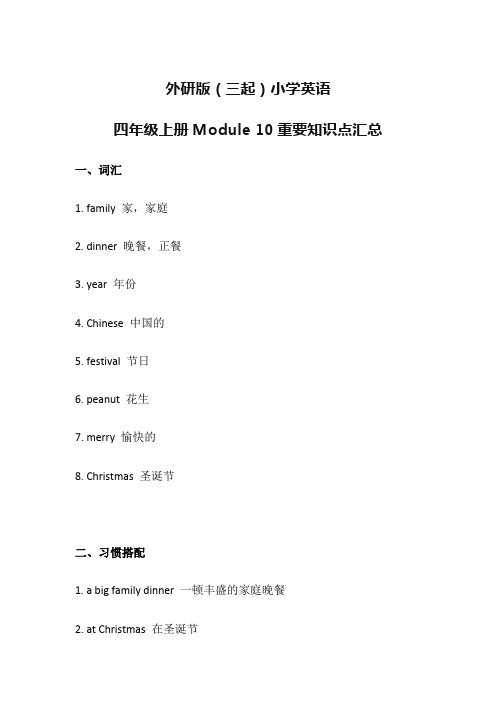
外研版(三起)小学英语四年级上册Module 10重要知识点汇总一、词汇1. family 家,家庭2. dinner 晚餐,正餐3. year 年份4. Chinese 中国的5. festival 节日6. peanut 花生7. merry 愉快的8. Christmas 圣诞节二、习惯搭配1. a big family dinner 一顿丰盛的家庭晚餐2. at Christmas 在圣诞节3. the Spring Festival 春节4. New Year 新年三、惯用表达1. I see. 我明白了。
2. Happy New Year! 新年快乐!3. Merry Christmas! 圣诞快乐!四、重点句型1. At / On + 节日名称, We + 动词(短语)原形(+ 其他).举例:At the Spring Festival, we have a big family dinner.在春节,我们吃一顿丰盛的家庭晚餐。
举例:At the Dragon Boat Festival, we eat zongzi and have dragon boat races. 在端午节,我们吃粽子,举行龙舟比赛。
2. –What do you do at / on + 节日?–I / We + 动词(短语)原形(+ 其他).问:What do you do at Christmas? 在圣诞节你们做什么?答:We sing songs. 我们唱歌。
问:What do you do at the Spring Festival? 在春节你做什么?答:I eat dumplings with my family. 我和我的家人一起吃饺子。
三起点外研版新标准英语四年级上册期末考试重难点知识点复习及练习
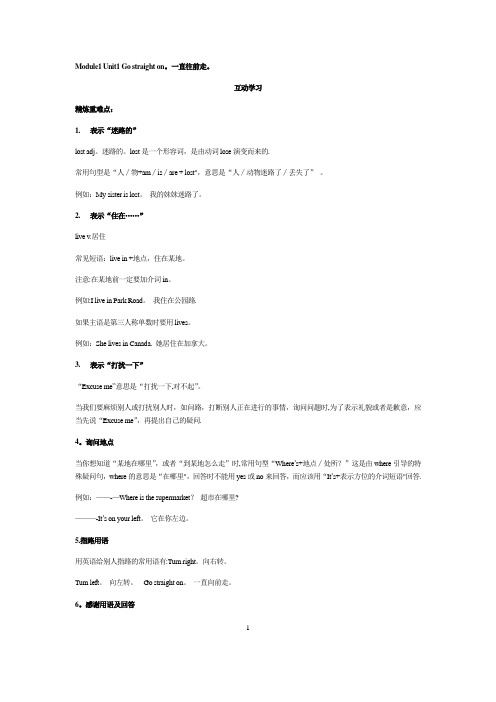
Module1 Unit1 Go straight on。
一直往前走。
互动学习精炼重难点:1.表示“迷路的”lost adj。
迷路的。
lost是一个形容词,是由动词lose演变而来的.常用句型是“人∕物+am∕is∕are + lost",意思是“人∕动物迷路了∕丢失了”。
例如:My sister is lost。
我的妹妹迷路了。
2.表示“住在……”live v.居住常见短语:live in +地点,住在某地。
注意:在某地前一定要加介词in。
例如:I live in Park Road。
我住在公园路.如果主语是第三人称单数时要用lives。
例如:She lives in Canada. 她居住在加拿大。
3.表示“打扰一下”“Excuse me”意思是“打扰一下,对不起”。
当我们要麻烦别人或打扰别人时,如问路,打断别人正在进行的事情,询问问题时,为了表示礼貌或者是歉意,应当先说“Excuse me”,再提出自己的疑问.4。
询问地点当你想知道“某地在哪里”,或者“到某地怎么走”时,常用句型“Where’s+地点∕处所?”这是由where引导的特殊疑问句,where的意思是“在哪里",回答时不能用yes或no来回答,而应该用“It’s+表示方位的介词短语"回答.例如:——-—Where is the supermarket?超市在哪里?———-It’s on your left。
它在你左边。
5.指路用语用英语给别人指路的常用语有:Turn right。
向右转。
Turn left。
向左转。
Go straight on。
一直向前走。
6。
感谢用语及回答1Thank you. 谢谢你。
为感谢用语。
当他人帮助了自己或夸奖、赞美自己时,我们要说“Thank you"来表示感谢。
其回答为:Y ou're welcome。
不用谢.Module2词汇:精炼重难点:1.表示“看……”look 表示“看"的这个动作,是不及物动词.look后面跟人或物时,必须要加上介词at.例如:Look at the English car. 看那辆英国小汽车.口语练习:Look at the teacher∕girl. 看这位教师∕这个女孩.2.表示“这些"these 这些。
外研版四年级英语上册复习知识点归纳总结

外研版四年级英语上册复习知识点归纳总结外研版四年级英语上册是学生在学习英语过程中的重要阶段,该册内容涵盖了英语的基础知识和技能,包括词汇、语法、听力、口语和阅读等。
本文将对该册中的复习知识点进行归纳总结,以帮助学生更好地复习和掌握所学内容。
一、词汇部分1. 单词记忆在本册中,学生需要掌握一些基础的英文单词,如颜色、数字、食物、动物等。
为了更好地记忆这些单词,学生可以通过与图片的配对、单词拼写、造句等方式进行记忆。
2. 词组搭配除了单词的记忆,学生还需要学会一些常用的词组搭配,如"howare you"、"thank you"、"in the morning"等。
通过反复使用这些词组,可以加深记忆,提高语言表达的流利度。
二、语法部分1. 人称代词学生需要学习使用人称代词,包括主格代词(I、you、he、she、it、we、they)和宾格代词(me、you、him、her、it、us、them)。
在句子中正确使用人称代词,能够更准确地表达自己的意思。
2. 句型转换学生需要学会进行句型转换,如将陈述句变为疑问句、将肯定句变为否定句等。
通过练习句型转换,能够加深对句子结构的理解,提高语言运用的灵活性。
三、听力部分1. 听力理解学生需要通过听力练习来提高对英语的听力理解能力。
在听力练习中,要注意听清楚句子中的关键词,理解句子的意思,并能够作出正确的回答。
2. 句子朗读孩子可以通过听力材料中的句子朗读来提高口语表达能力。
在朗读时,要注意语音语调的准确,以及情感的表达,使语言更加地自然和流利。
四、口语部分1. 对话练习学生需要进行一些对话练习,将所学的知识运用到实际交流中。
可以通过与同学、老师或家长进行对话,模仿对话中的语音语调和表情动作,以及练习常用的问候语和交际用语。
2. 自由口语学生还可以通过自由口语来提高口语表达能力。
可以选择一些自己感兴趣的话题进行口语练习,如家庭、朋友、爱好等。
新外研版(三起)英语四年级上册全册知识点归纳
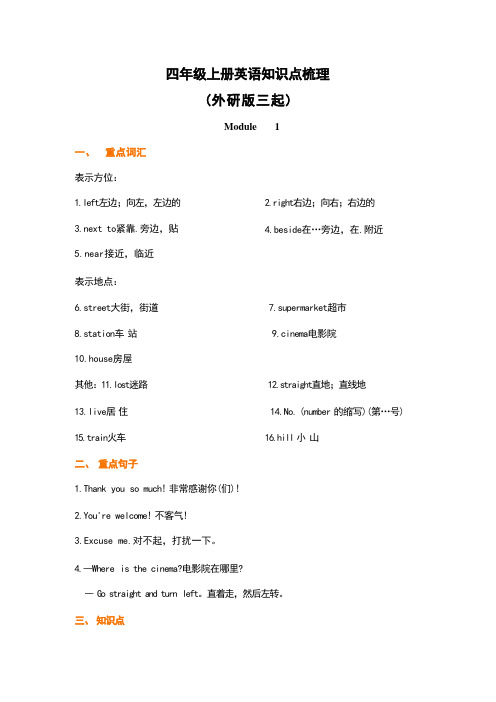
四年级上册英语知识点梳理(外研版三起)Module1一、重点词汇表示方位:1.left左边;向左,左边的2.right右边;向右;右边的3.next to紧靠.旁边,贴4.beside在…旁边,在.附近5.near接近,临近表示地点:6.street大街,街道7.supermarket超市8.station车站 9.cinema电影院10.house房屋其他:11.lost迷路 12.straight直地;直线地13.live居住14.No. (number 的缩写)(第…号)15.train火车 16.hill 小山二、重点句子1.Thank you so much! 非常感谢你(们)!2.You're welcome! 不客气!3.Excuse me.对不起,打扰一下。
4.--Where is the cinema?电影院在哪里?-- Go straight and turn left。
直着走,然后左转。
三、知识点习惯搭配live at住在No.2Park Street公园街2号go straight on直着走at the station在车站turn left / right向左/右转beside the cinema在电影院旁边all day/ night整日/夜so much十分,非常句子结构询问某人/物的位置-- Where is …?--I t's+其他eg:1.-- Where is the library?-- It's near the park.2.--Where is the cinema?-- Go straight and turn left3.-- Where is my book?-- It's on the desk.Module2一、重点词汇动词:read(读,阅读) take(拍摄)listen( 听) talk(说话,交谈)名词:picture(照片) children(孩子们)(child 的复数形式) China(中国)其他:running(跑步) these(这些)二、重点句子1.Look at these pictures. 看这些照片。
外研版英语三年级起点四年级上册

外研版英语三年级起点四年级上册一、单词部分。
1. Module 1.- 单词汇总。
- straight [streɪt] 直地,直线地。
- left [left] 左边;向左;左边的。
- right [raɪt] 右边;向右;右边的。
- lost [lɒst] 迷路的。
- live [lɪv] 居住。
- No. (number的缩写)第……号。
- street [striːt] 大街,街道。
- excuse me对不起,打扰。
- turn left向左转。
- turn right向右转。
- next to紧靠……旁边,贴近。
- supermarket ['suːpəmɑːkɪt] 超市。
- beside [bɪ'saɪd] 在……旁边,在……附近。
- cinema ['sɪnəmə] 电影院。
- 重点单词用法。
- “left”和“right”:这两个单词既可以作名词表示方向(左边、右边),也可以作形容词(左边的、右边的)和副词(向左、向右)。
例如:Turn left at the second crossing.(在第二个十字路口向左转。
)The book is on my right hand.(书在我的右手边。
)- “live”:是不及物动词,后面常接表示地点的介词短语。
例如:I live in Beijing.(我住在北京。
)2. Module 2.- 单词汇总。
- read [riːd] 阅读。
- running [ˈrʌnɪŋ] 跑步。
- these [ðiːz] 这些。
- picture ['pɪktʃə(r)] 图画。
- take [teɪk] 拍摄。
- children ['tʃɪldrən] (child的复数形式) 孩子们。
- listen ['lɪsn] 听。
- talk [tɔːk] 说话,交谈。
- China ['tʃaɪnə] 中国。
外研三起英语四年级上册
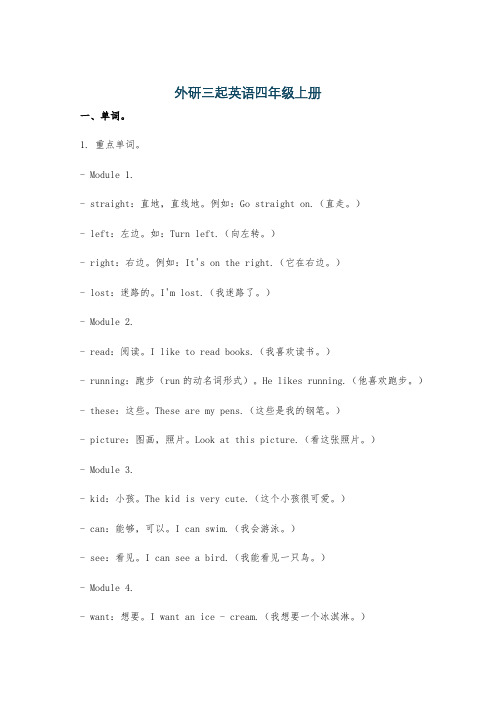
外研三起英语四年级上册一、单词。
1. 重点单词。
- Module 1.- straight:直地,直线地。
例如:Go straight on.(直走。
)- left:左边。
如:Turn left.(向左转。
)- right:右边。
例如:It's on the right.(它在右边。
)- lost:迷路的。
I'm lost.(我迷路了。
)- Module 2.- read:阅读。
I like to read books.(我喜欢读书。
)- running:跑步(run的动名词形式)。
He likes running.(他喜欢跑步。
)- these:这些。
These are my pens.(这些是我的钢笔。
)- picture:图画,照片。
Look at this picture.(看这张照片。
)- Module 3.- kid:小孩。
The kid is very cute.(这个小孩很可爱。
)- can:能够,可以。
I can swim.(我会游泳。
)- see:看见。
I can see a bird.(我能看见一只鸟。
)- Module 4.- want:想要。
I want an ice - cream.(我想要一个冰淇淋。
)- juice:果汁。
I like orange juice.(我喜欢橙汁。
)- ice:冰,冰块。
There is some ice in the glass.(杯子里有一些冰。
)- also:也,还。
I like apples, and I also like bananas.(我喜欢苹果,我也喜欢香蕉。
)- Module 5.- noodles:面条。
I have noodles for lunch.(我午餐吃面条。
)- rice:米饭。
Rice is very important in Asian countries.(米饭在亚洲国家很重要。
)- fish:鱼,鱼肉。
外研版(三起)英语四年级上册全册知识点汇总复习
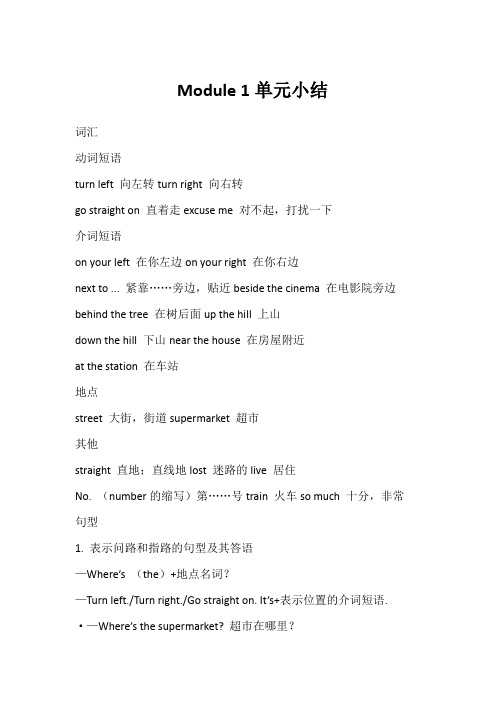
Module 1单元小结词汇动词短语turn left 向左转turn right 向右转go straight on 直着走excuse me 对不起,打扰一下介词短语on your left 在你左边on your right 在你右边next to ... 紧靠……旁边,贴近beside the cinema 在电影院旁边behind the tree 在树后面up the hill 上山down the hill 下山near the house 在房屋附近at the station 在车站地点street 大街,街道supermarket 超市其他straight 直地;直线地lost 迷路的live 居住No. (number的缩写)第……号train 火车so much 十分,非常句型1. 表示问路和指路的句型及其答语—Where’s (the)+地点名词?—Turn left./Turn right./Go straight on. It’s+表示位置的介词短语. ·—Where’s the supermarket? 超市在哪里?—Go straight on. Turn right. It’s near the park. 直着走。
向右转。
它在公园附近。
2. 常用感谢语的答语You’re welcome! 不客气!Module 2 单元小结词汇动作read a book 读书play football 踢足球play basketball 打篮球take pictures 照相watch TV 看电视fly a kite 放风筝listen to music 听音乐ride a bike 骑自行车play with 玩……talk to 和……交谈指示代词this 这个that 那个these 这些those 那些其他children (child的复数形式)孩子们China 中国running 跑步句型询问对方正在干什么的句型及其答语—What are you doing?—I’m+动词-ing形式+其他.·—What are you doing? 你正在做什么?—I’m listening to music. 我正在听音乐。
小学英语外研社(三起)四年级上册知识点汇总
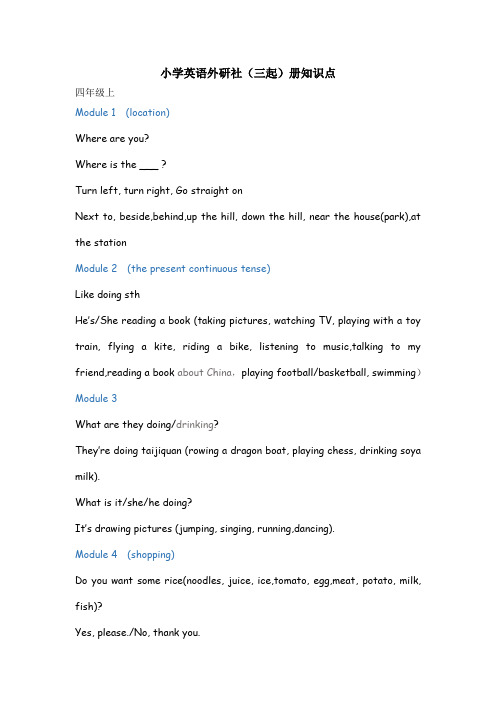
小学英语外研社(三起)册知识点四年级上Module 1 (location)Where are you?Where is the ___ ?Turn left, turn right, Go straight onNext to, beside,behind,up the hill, down the hill, near the house(park),at the stationModule 2 (the present continuous tense)Like doing sthHe’s/She reading a book (taking pictures, watching TV, playing with a toy train, flying a kite, riding a bike, listening to music,talking to my friend,reading a book about China,playing football/basketball, swimming)Module 3What are they doing/drinking?They’re doing taijiquan (rowing a dragon boat, playing chess, drinking soya milk).What is it/she/he doing?It’s drawing pictures (jumping, singing, running,dancing).Module 4 (shopping)Do you want some rice(noodles, juice, ice,tomato, egg,meat, potato, milk, fish)?Yes, please./No, thank you.How much is it?10 yuan.Can I help you?I like__. How much is it?___ yuan.I want it, please.Here you are.Thanks you.Module 5Can you run fast (jump high, jump far,ride fast,skate, ride a bike) ? winner Yes, I can. /No, I can’t.Module 6Can I have some soup (sweets, bread, cake, fruit)?Yes, you can./ Sorry, you can’t.(culture:Halloween)Module 7There is___.There are___.(eating vegetable/fruit, riding a horse)(horse, sheep, chicken, bear, pig, vegetable, fruit)Module 8 (be going to)plan to do sthWe’re going to swim.I’m going to visit my grandma (get up at 5 o’clock).Module 9 (sports day)Are you going to ___ ?What are you going to do?I’m going to run the 100 meters ( do the high jump, do the long jump, run the 200 meters and 400 meters).(play football, play basketball, play pingpong, swim)Module 10At spring festival, we have a big family dinner.We say, “Happy New Year!”At Christmas, we sing songs.We have a Christmas tree.We give presents.We eat a lots of food.(culture: Chinese new year & Christmas)。
